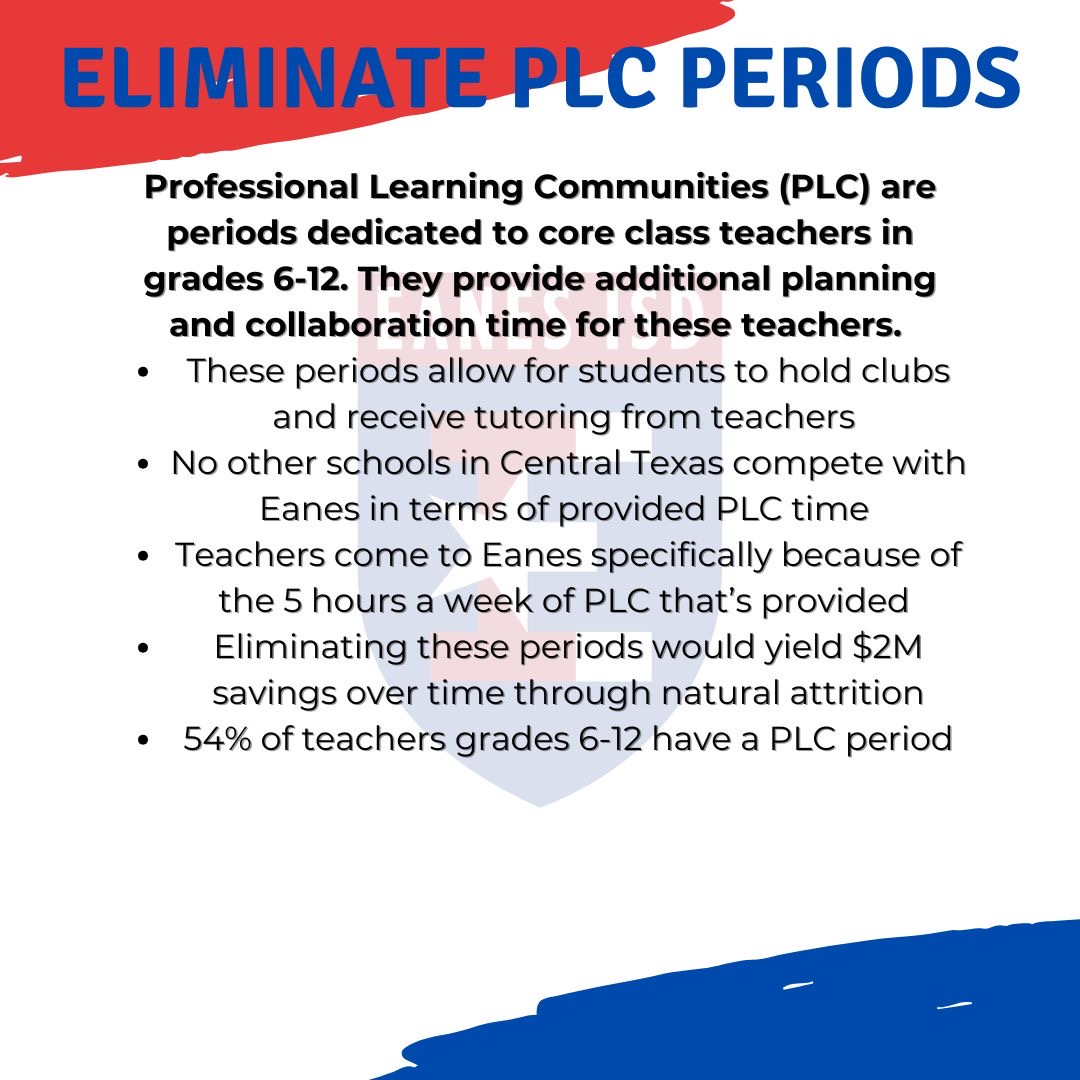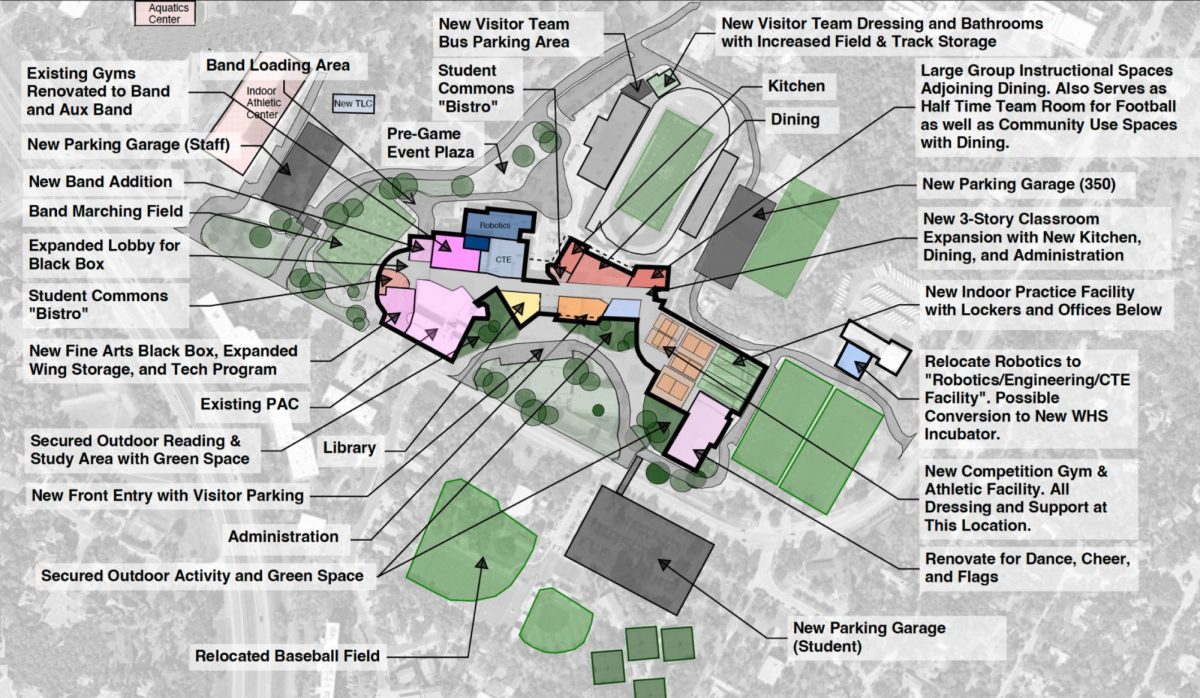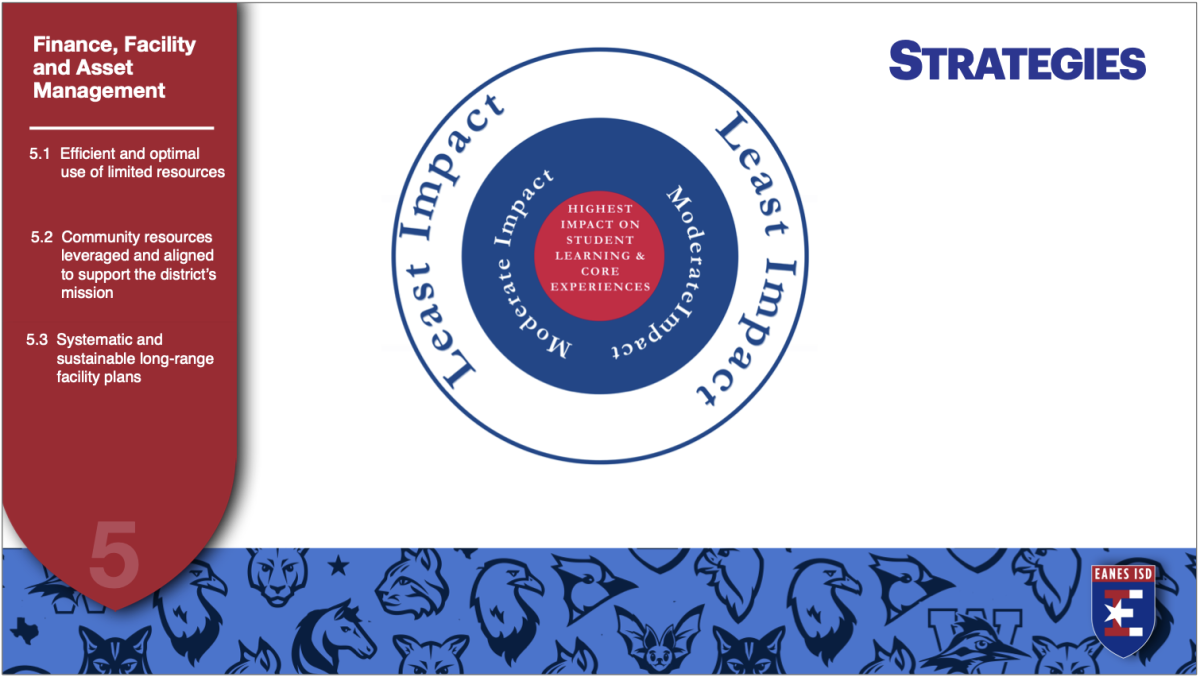Superintendent Dr. Jeff Arnett announced at a staff meeting Wednesday that administration will remove Professional Learning Communities (PLC) in the 2025-26 school year.
The removal of PLC periods, with an additional class for teachers, was proposed as a possible solution to address the district budget crisis. The district is facing a $3.3 million deficit from lack of state funding and other external factors, and the removal of PLCs would save money–an estimated $2 million–via attrition.
At the middle and high schools in Eanes ISD, core subject teachers receive a class period designated as a PLC, which is a dedicated time for teachers to meet and plan with their peers within their department. At the high school, these PLC periods are what make Westlake “go from excellent to exemplary” according to English II Honors teacher Jeff Montgomery.
“We do not like eliminating the PLC periods currently available to several teachers at Westlake High School and both of our middle schools,” Superintendent Dr. Jeff Arnett said. “We recognize the instructional benefit that comes from educator collaboration, planning, professional development and alignment, which are afforded by the PLC periods. Unfortunately, many school districts like Eanes ISD are grappling with significant budget deficits due to no new state funding from the Texas Legislature since 2019.”
Many other schools in the state don’t offer PLCs, and PLCs directly correlate with the quality of education the district produces, according to AP US History teacher Cathy Cluck.
“I know that the district is looking for a solution to the budget crisis,” Cluck said. “I know that it is a viable solution to the budget crisis, but I also think that there is going to be some adjustment of expectation that’s going to have to occur. If our AP scores are not as high as they were this year, last year, then I think we need to expect that.”
While PLCs can be summed up as an extra period for planning, they are used for a plethora of different things that benefit both teachers and students. Core teachers meet almost daily to collaborate with their teams, which is especially useful for those who teach more than one course, like Honors Geometry and AP Precalculus teacher Edgar Walters.
“It’s a time for all the teachers to be in the same room and to make sure that really, the materials that we are providing to students are high quality,” Walters said. “I’m on two different teams… and I meet between three and five times a week with them.”
This frequent collaboration is important for teachers to make sure they are all on the same page when it comes to teaching the course and grading consistently. Without PLC periods, many teachers fear that their teams would become less coordinated, which could unfairly impact the experience students have in different classrooms.
“Because of the academic competitiveness [at Westlake, it’s important] to make sure that we’re grading the same,” Math Department Chair and AP Calculus BC teacher Jocelyn Bixler said. “Kids all want to be graded the same. They find out about that pretty quickly… because it’s within a thousandth of a point when you start looking at the GPA.”
One of the major advantages of PLCs is that they provide core subject teachers with time to gather and analyze results of assessments, using that data to identify topics students may be struggling with. Teachers use that data to ensure students are properly learning and understanding the material. Without this organized period, teachers do not believe the same quality of education will be maintainable.
“[Removing PLC is] going to not only affect me, it’s going to trickle down to students, and that’s the part that I think is most scary for us,” Science Department Chair and teacher Denise DeMartino said. “It’s going to make us be less innovative. We’re going to be more apt to use what we did last year because we’re not going to have the time to create those new activities.”
Additionally, the removal of PLCs may begin to affect students in other ways than the quality of education. Beyond their responsibilities to teach, many teachers use their personal time to further support students by sponsoring clubs, writing recommendation letters, coaching UIL and tutoring.
“Teaching is a labor of love,” Walters said. “I think you’ll find every Westlake teacher brings work home with them to some extent, but there are only so many hours in the day. I worry about if I, as a teacher, can set aside time like I do now to offer tutoring… write as many rec letters… those are hours that now I’m going to have to spend doing the work that I was previously doing in PLC periods.”
Removing PLCs could also affect teachers’ professional growth, especially for newer teachers in the district. The collaboration between teachers allows them to bounce ideas off one another. More experienced teachers can discover new ideas and opportunities from others and be pushed out of their comfort zone, according to Cluck. Newer teachers can receive guidance and help from those who have been teaching longer.
“Being a new teacher is hard,” Cluck said. “I think it takes at least three years to feel like you know what’s going on in a new subject. If you don’t have somebody with experience to kind of bounce your ideas off of, it’s that much more isolating for new teachers.”
That is not to say that the removal of PLCs will remove guidance for new teachers as experienced teachers like Bixler ensure they will “always support new teachers,” but rather that it would remove part of the competitive edge Eanes has when it comes to recruiting new teachers.
Since PLCs are an important tool for keeping teachers in the district, some teachers are concerned about the effect removing PLCs may have on recruiting new teachers.
“When [new teachers coming in] look at our salary, which is the lowest of anyone in our area, as well as the fact that we don’t have PLC… we really are losing our competitive edge as far as getting new people into the district,” DeMartino said.
However, the removal of PLCs is projected to yield $2 million in savings and Arnett said the choice came down to that or “freezing salaries for all staff to avert the projected budget shortfall” next year.
“Once a decision like this gets made, my job and my role is to see how it’s going to impact our students and staff,” Principal Steve Ramsey said. “My main job, with this new parameter, is to monitor and adjust as needed to make sure we keep going in the right direction positively with our students and staff.”
Additionally, the removal of PLCs could also solve the inequity between non-core and core subject teachers. Core teachers are primarily the ones who receive these planning periods, and some elective teachers who don’t have daily PLCs to begin with are unaffected by the decision of their removal. This includes Spanish III and Spanish IV teacher Kristine Vanwisse.
“Do you have that much to talk about every single day every week?” Vanwisse said. “I just feel like [the removal of PLCs] is okay because as foreign language teachers, and [other elective teachers] who don’t have PLCs, we make it.”
As the only Spanish III and IV teacher, it’s significant to note that Vanwisse may not need as much time for collaboration as core teachers. But even without a PLC period, she is still able to plan her courses and sponsor a club during her lunch break.
“We have the extra class, but we don’t receive extra pay, and the people who have PLCs, they teach one less class,” Vanwisse said. “But I do end up with extra classes, extra kids and equal pay to people who are purposefully missing a class. [The removal] would add more balance to our schedule.”
Vanwisse’s comments highlight another issue at the high school, with teachers with PLCs having more paid time to plan during school, while certain elective teachers make do with what they have.
With the removal of PLCs in the 2025-26 school year, core-subject teachers will need to begin to consider how to adjust to their new schedules.
“It makes me real sad because [we’re] thriving with the PLC to now just surviving,” DeMartino said. “I really wish we could keep the status quo and maintain our caliber of excellence, but I just don’t think we can [without PLCs]. I think we’re gonna have to make some changes.”














Diego • Jan 19, 2025 at 7:57 am
One question the story did not answer is if this will result in small class sizes. When I taught at WHS years ago, I had 5 classes with around 135 students total. If I had 6 classes, but still 135 students, I wouldn’t mind losing PLC. But if it meant that I suddenly have 160-175 students for the same amount of salary, I would not be happy.